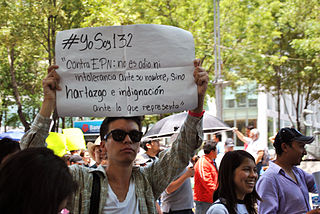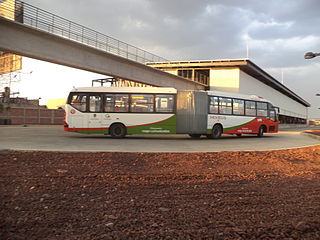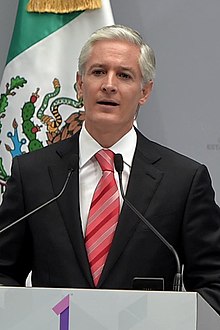
The Institutional Revolutionary Party is a political party in Mexico that was founded in 1929 and held uninterrupted power in the country for 71 years, from 1929 to 2000, first as the National Revolutionary Party, then as the Party of the Mexican Revolution and finally as the PRI beginning in 1946.

Enrique Peña Nieto, commonly referred to by his initials EPN, is a Mexican politician who served as the 64th president of Mexico from 1 December 2012 to 30 November 2018. A member of the Institutional Revolutionary Party (PRI), he previously served as Governor of the State of Mexico from 2005 to 2011, local deputy from 2003 to 2004, and Secretary of Administration from 2000 to 2002.

The governor of the State of Mexico wields executive power in the State of Mexico.
This is a list of events that happened in 2011 in Mexico. The article also lists the most important political leaders during the year at both federal and state levels.

Eruviel Ávila Villegas is a Mexican politician, member of the Institutional Revolutionary Party, and the Governor of the State of Mexico from 2011 to 2017. Before that, he was Mayor of Ecatepec de Morelos twice, from 2003 to 2006 and from 2009 to 2012, and deputy of the State of Mexico's Congress.

Luis Videgaray Caso is a Mexican politician who served as the Secretary of Foreign Affairs from 2017 to 2018. Previously he was the Secretary of Finance and Public Credit, also in the cabinet of Enrique Peña Nieto, from 2012 to 2016. Prior to Peña Nieto's victory in the elections, Videgaray was General Coordinator of his campaign for the 2012 Mexican presidential election. On July 11, 2012, Peña Nieto announced Videgaray as the person in charge of promoting the economic reforms and the government agenda's related topics, and on September 4, he named Videgaray as co-head of the team that set policy direction for the new government that took office on December 1, 2012.

General elections were held in Mexico on Sunday, 1 July 2012. Voters went to the polls to elect a new President of the Republic to serve a six-year term, replacing Felipe Calderón, 500 members of the Chamber of Deputies and 128 members of the Mexican Senate.

Yo Soy 132, commonly stylized as #YoSoy132, was a protest movement composed of Mexican university students from both private and public universities, residents of Mexico, claiming supporters from about 50 cities around the world. It began as opposition to the Institutional Revolutionary Party (PRI) candidate Enrique Peña Nieto and the Mexican media's allegedly biased coverage of the 2012 general election. The name Yo Soy 132, Spanish for "I Am 132", originated in an expression of solidarity with the original 131 protest's initiators. The phrase drew inspiration from the Occupy movement and the Spanish 15-M movement. The protest movement was known worldwide as the "Mexican spring" after claims made by its first spokespersons, and called the "Mexican occupy movement" in the international press.

General elections were held in Mexico on 1 July 2018. Voters elected a new President of Mexico to serve a six-year term, 128 members of the Senate for a period of six years and 500 members of the Chamber of Deputies for a period of three years. It was one of the largest election days in Mexican history, with most of the nation's states holding state and local elections on the same day, including nine governorships, with over 3,400 positions subject to elections at all levels of government. It was the most violent campaign Mexico has experienced in recent history, with 130 political figures killed since September 2017.
Alfredo Hilario Isidro del Mazo González was a Mexican politician affiliated with the Institutional Revolutionary Party.
Peñabots is the nickname for automated social media accounts allegedly used by the Mexican government of Enrique Peña Nieto and the PRI political party to keep unfavorable news from reaching the Mexican public. Peñabot accusations are related to the broader issue of fake news in the 21st century.
Carolina Monroy del Mazo is a Mexican politician and member of the Institutional Revolutionary Party, currently serving as the secretary-general of the PRI and as a federal deputy to the LXIII Legislature of the Mexican Congress, representing the 27th Federal Electoral District of the State of Mexico.
This is a list of events that happened in 2017 in Mexico. The article also lists the most important political leaders during the year at both federal and state levels.

Delfina Gómez Álvarez is a Mexican politician affiliated with the National Regeneration Movement (MORENA) who has served as the Governor of the State of Mexico since 2023. She previously served as the head of the Secretariat of Public Education appointed by President Andrés Manuel López Obrador. She served as a senator from the State of Mexico in the LXIV Legislature of the Mexican Congress. She also has served as a federal deputy and mayor.
Events of 2019 in Mexico. The article also lists the most important political leaders during the year at both federal and state levels and includes a brief year-end summary of major social and economic issues.

Events pertaining to 2021 in Mexican politics and government.

Gubernatorial elections were held in Mexico on June 6, 2021. Governors were to be elected in the states of Baja California, Baja California Sur, Chihuahua, Colima, Guerrero, Michoacán, Nayarit, Nuevo León, Sinaloa, Sonora, Campeche, Querétaro, San Luis Potosí, Tlaxcala, and Zacatecas. The formal period of campaigning is from March 5 to June 2, 2021.

Local elections were held in Mexico on June 6, 2021. Local elections were held for thirty state congresses, 1,900 town halls, Mexico City borough mayors, municipal boards and municipal presidents. Fifteen gubernatorial elections and federal legislative elections will be held the same day.

The Mexibús Line II is a bus rapid transit (BRT) line in the Mexibús system. It operates between La Quebrada in Cuautitlán Izcalli and Las Américas in Ecatepec de Morelos. It was the second line to be built and the third to be opened. It was inaugurated by the governor of the State of Mexico, Eruviel Ávila on 12 January 2015 with 43 stations. It is 21.3 kilometers (13.2 mi) long. The line has two different types of services, and both include a service exclusively for women and children named Servicio Rosa. The line operates with 97 buses. On 8 October 2018, the Servicio Exprés was opened, going from Lechería to Ecatepec stations.

The Mexibús Line III is a bus rapid transit (BRT) line in the Mexibús system. It was the third line to be built and the second to be opened. It operates between Chimalhuacán, in the State of Mexico and Pantitlán metro station in Iztacalco and Venustiano Carranza, in Mexico City. It was inaugurated by the governor of the State of Mexico, Eruviel Ávila on 30 April 2013 with 29 stations. Another station was opened in 2019. In 2023, an extension was added from Chimalcuacán Municipality to Chicoloapan de Juárez. It is 23 kilometers (14 mi) long. The line operates with 85 articulated buses.











